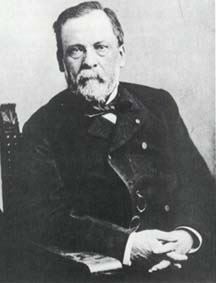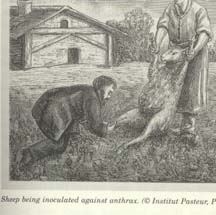 |
Louis Pasteur (1822-1895) was the great French scientist whose work has saved millions of lives. Through careful study of microbiological organisms, he divined how these tiny "microbes" cause disease. His discovery that microbes could be killed through heating has people heating liquids, such as milk or juice, in a process called Pasteurization. Because of his work, hospitals developed more rigorous hygiene practices, which made them much safer places to recover from illness.
Pasteur was known as the father of stereochemistry, but his contributions to microbiology and medicine were greater. Pasteur discovered anaerobic bacteria and two silkworm diseases. It was he who discovered that if you take a microbe that causes a particular disease, for instance, smallpox, and make a weakened form of it, that weakened smallpox microbe can be used to fight off the stronger smallpox microbes. Doctors now inoculate people against all kinds of diseases and, for a time, had almost eradicated smallpox. Pasteur also invented the anthrax vaccine, the chicken cholera vaccine, and the rabies vaccine.
 |
These discoveries made him so famous that he was able to build an institute in Paris for research, teaching, and treating disease. Inaugurated in 1888, the Pasteur Institute ranks as one of the foremost research centers in the world.
Page created on 7/11/2015 3:45:15 PM
Last edited 12/24/2020 10:38:55 PM
Louis Pasteur Disease Fighter by Linda Wasmer Smith, published by Enslow Publishers, Inc., 1997.
Louis Pasteur: Hunting Killer Germs (Ideas on Trial) by E.A.M Jakab, published by McGraw-Hill.
